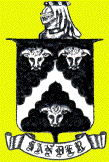
We continued across country dropping men off at every large station. When the train arrived at Camp Beale in northern California I too got off to be relieved from active duty and get a rise in grade to Major. Georgia was left alone except for the train conductor who promised to see her safely into my mother's hands at the Oakland station. I arrived two days later and took a taxi home.
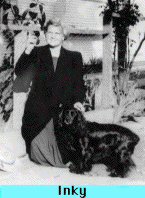
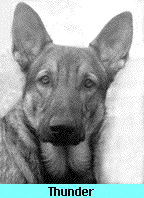
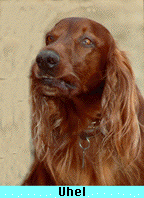
|
The house on 19th Avenue where I had lived from age five to twenty-two was welcoming, but Inky had been killed in the street by a car two weeks before my homecoming. He was intelligent and biddable. His favorite game was to search for a silver dollar that I had hidden within his reach. He would hunt frantically until he found it and then come to me and show it triumphantly, giving it up only reluctantly after much coaxing. However, if ordered to 'Drop It!' he would do so with a reproachful look. I wasn't playing according to the rules he knew.
The Army's terminal leave ended late in September, and in October I returned to Arabia, this time by air, the first of many boring trips punctuated by unscheduled delays. Georgia remained at home awaiting the construction of housing in Dhahran which I had been promised would be available in less than six months. She found company in Jeannine Ferrand, another Frenchwoman who had found her life's companion in Bob Ferrand, an OSS officer who had suffered spinal injuries on his first drop by parachute.
Georgia arrived near the end of February 1947. After living in a small and dismal apartment in the Ras Tanura complex for several months we were assigned half of a cottage-like duplex at the Terminal, about a mile from the tanker-loading pier. It was an idyllic spot. We were on the beach only a hundred feet from the water which was swimmable because a sand bar kept the sharks at bay. The sea was an ever-changing panorama of color, particularly at sunrise, with the vivid green of the shallows giving way to the deep blue and purple of the open, "wine-dark" sea surmounted by the orange and pink of the rising sun, even more spectacular when clouds were present to lend tints of cerise, yellow, and violet. But the desert was beautiful only at dawn and dusk when the undulant sweep of crescent dunes was limned by violet shadows, and at night when brilliant stars in a blue-black firmament lighted travel free of the burning rays and dazzling mirage of day. Life in camp was often lonely but professionally rewarding.
And I had other duties. On some of his trips to the field Dick Bramkamp asked me to accompany him. The field geologists (two man parties with Arab support) spent months without returning to Dhahran. Dick visited them to check on their progress and to confirm and enlarge his own prior observations. On more than one occasion Dick was away and I was able to help in his stead, particularly when fossil identification could resolve a mapping problem. These photos give some idea of life in the field.
I was pleased with my job and was making good progress on the thesis when out of the blue, in December 1951, management decided that I was to be transferred to New York to establish a laboratory for the petrologic study of reservoir rocks and for critical review of the criteria used for stratigraphic analyses. I had a three-month long leave to take and decided that by working night and day I could finish up the thesis and present it during that time. I packed up the photomicrographic apparatus that I designed and had constructed, and shipped it to Paris along with the fossils I was studying. The Wild microscope stand that was part of the apparatus caused me difficulties in importation unto France, but eventually all was resolved.satisfactorily.
Georgia found a furnished apartment for rent and we took it, although it was not conveniently situated. Then began a period of frantic efforts to print what I had written, to draw maps and to prepare plates for the presentation of the pictures of microfossils that I had taken and was still taking. But with Geogia typing stencils and cranking them out on a mimeograph machine and with a photographer making final versions of my paste-up plates and maps I was able to prepare the required twelve copies of the thesis. War-time rules for reduced printings were still in effect, fortunately for me, for we would never have been able to have a normal press run in the three months available. Professor Cuvillier pulled strings to open the facilities of the Sorbonne to me, including the services of the head photographer and his projection equipment.
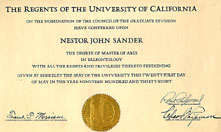
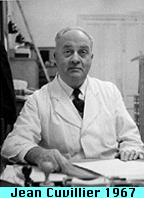
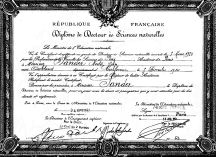
|
So, on 5 March 1952 I stood and talked for three hours to a jury of three professors and a crowd of about a hundred spectators. (many more than I anticipated) I was granted the title of Docteur es Sciences naturelles with a 'Mention très honorable.' It was not merely a university degree, but was recognized by the state as giving me the right to teach in France. We had the usual champagne with the jury that I thanked for their indulgence, then sent a cable to Arabia and took off for New York.
Top
Page 1
Page 2
Page 4
Page 5
Page 6